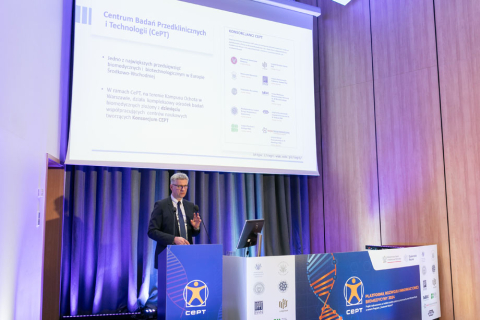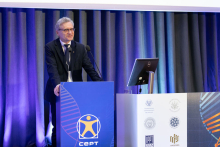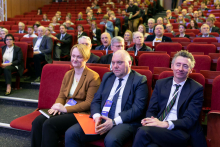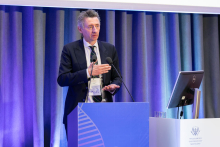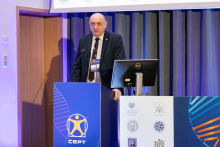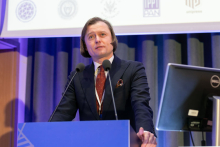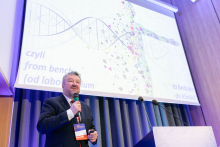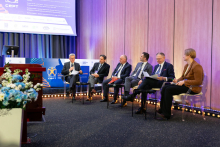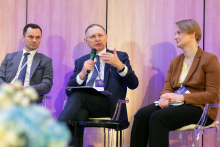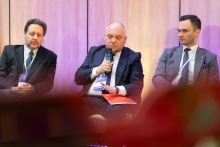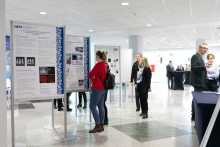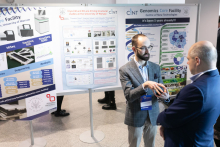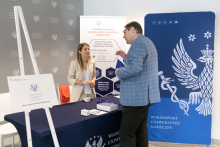Almost 400 people attended the event (and nearly 550 registered their participation), representing various fields of science, from medicine and pharmacy, through physics and chemistry, up to information science, members of multiple research institutes, business owners and representatives of the business sector. Among those present, there were representatives of government ministries working with CePT.
– The Preclinical Testing and Technology Center (CePT) is a consortium that really works – said professor Zbigniew Gaciong, Rector of WUM, while opening the conference, and he added: – It is formed by a group of people who are capable of setting and jointly pursuing their goals, as the financial success of CePT demonstrates. It merges the best research centers in Poland, it is capable of transferring technologies outside and can be a place of education for young researchers. Furthermore, it contributes to the development of Polish science and Polish economy.
The Preclinical Testing and Technology Center (CePT) ubi es?
The Preclinical Testing and Technology Center (CePT) consists of 10 closely collaborating local research centers. The Center has 47 advanced laboratories with high profile specialist testing equipment, used by several thousand researchers, graduate and post-graduate students. Within CePT, researchers solve complex issues “from molecular level to the patient’s bed”, and work on shortening the lead times for implementation of new technologies and products.
At the moment, CePT is pursuing research projects with other centers based in several dozen countries, working together with businesses and R&D organizations. Last year, the income and the value of R&D projects executed in collaboration with foreign partners was at 118 million PLN and the income from working with the business environment was at 39 million PLN, which proves the importance and competitive advantage of CePT in the field of research services.
– What we are jointly trying to do is to change the world for the better – said professor Piotr Pruszczyk, Vice-Rector for Science and Technology Transfer, adding: – We want our consortium to be a development platform for biomedicine, we are also interested in talking about new challenges. Together, we can accomplish much more.
Representatives of State and local government institutions spoke at the CePT ubi es? session as well.
Maciej Gdula, Undersecretary of State at the Ministry of Science and Higher Education, spoke about the measures undertaken by the Ministry for funding and fostering growth of science and research, pointing out that the Ministry was ready to negotiate with the academic circles.
– What matters for me is that a certain definite model for promoting science is developed in the course of these discussions. I strongly believe that without a major pressure on the importance of science and research, without emphasizing the fact that people benefit from that, that researchers do an important job, we will find it hard to gather adequate funding for it – Vice-Minister Maciej Gdula said.
Mariusz Frankowski, Voivode of Mazowieckie Province, said:
– I am glad that the CePT project will be growing successfully, for the research sector, for the healthcare sector, and finally for the people, not just here in the Mazovia region but also everywhere in Poland and Europe. And it is my belief that in terms of the research pursued here, it is a global arrangement as well.
Among other speakers, there was Krzysztof Saczka, Chief Sanitary Inspector, who presented the matter of data exchange standardization in the area of biomedicine, and Marcin Wajda, director of the Regional Development and European Funds Department at the Mazowieckie Province Marshal Office, who spoke briefly about the funding for projects in the 2021-2027 financial perspective.
Why investing in basic research is a good idea
Professor Tomasz Stokłosa, head of the Cancer Biology and Genetics Department at WUM Medical University of Warsaw and the WUM Genetics Laboratory, made his case about why it is a good idea to invest in basic research and why the development of centers such as CePT is crucially important.
Professor Stokłosa told the audience about his and his team’s genetic research involving next-generation sequencing in studying mutations in the TP53 gene, which is one of the major anticancer gene.
– As a lab, we were certified by the European Research Initiative on Chronic Lymphocytic Leukemia in 2016 and we were the first site in Poland to be admitted to such genetic testing – professor Stokłosa said.
Upon the launch of a drug program with chronic lymphocytic leukemia patients, hematologists began to look for centers and laboratories to perform tests on the mutation of the TP53 gene.
Professor Stokłosa further said: – In view of the CePT initiative and our ability to offer such research as a commercial platform, the Polish Adult Leukemia Group decided to assign certain funding to advanced genetic diagnostics not worldwide but at WUM Medical University of Warsaw. It gave us the opportunity to offer an advanced genetic test not just for patients from Warsaw but also from 21 other cities across Poland. The expert noted that our researchers successfully convinced the clinical circles that such an important genetic examination can be as well done in Poland as elsewhere in the world. They have also arranged future collaboration with multiple hematology sites in Poland and trained many diagnostic teams from all over Poland.
Other panels
Two more panels were held as well, one of them entitled “CePT pro futuro” and the other “Quo vadis biomedicine?”, and each was followed up by a discussion. We listened to more than twenty speeches delivered by researchers, leaders of research projects pursued by CePT. WUM Medical University of Warsaw was represented among the speakers by professor Rafał Płoski, head of the Medical Genetics Department, and professor Magdalena Kucia, head of Regenerative Medicine Laboratory. Among the debate participants, there was professor Małgorzata Lewandowska-Szumieł, head of the WUM Research Laboratory - Cell Bank, and professor Leszek Pączek, deputy chair of the WUM University Council.
Representatives of the following institutes within the CePT consortium spoke at the conference: Polish Academy of Sciences (PAN) Institute of High Pressure Physics, the Warsaw University, Institute of Fundamental Technological Research of the Polish Academy of Sciences, the Warsaw University of Technology, the Mossakowski Medical Research Institute of the Polish Academy of Sciences, the International Institute of Molecular and Cell Biology in Warsaw, the Nalecz Institute of Biocybernetics and Biomedical Engineering of the Polish Academy of Sciences, the Institute of Biochemistry and Biophysics of the Polish Academy of Sciences, the Nencki Institute of Experimental Biology of the Polish Academy of Sciences.
Sponsors of the event included: Rector of WUM Medical University of Warsaw, the Ministry of Development and Technology, the National Center for Research and Development; the honorary sponsors were the Marshal of Mazowieckie Provincial Government, the Minister of Health, the Minister of Science, the Ministry of Funds and Regional Policy, and the Medical Research Agency. Media sponsor: Rzeczpospolita and Medycyna Praktyczna.
The project received funding from the State budget, granted by the Minister of Science under the “Perfect Science II” Program.
